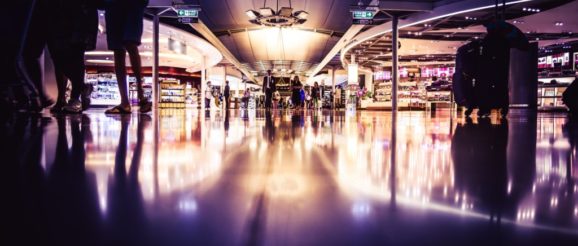Transforming Travel Retail & Supply Chain Infrastructure Post-Pandemic | CPO INNOVATION

Duty-free sales have been impacted by the coronavirus pandemic this year. According to research from the firm GlobalData, the outbreak will cost the Asia-Pacific industry a total of . That’s a 19.1% decline from the projected revenue.
Due to coronavirus, the prospects of the travel retail industry are looking grimmer than ever. Not only will the travel retail industry require a contingency plan in the future, but it will also have to evolve.
Effects of Coronavirus on the Travel Retail/Duty-Free
It is undeniable that COVID-19 has affected global travel as well as travel retail. Billions have been wiped off the projected revenue for 2020. As the outbreak intensifies, the flaws in the travel retail industry are being unmasked. Nothing but a total overhaul will fix this mess. But how?
How Will the Coronavirus Pandemic Change Travel Retail/Duty-Free Businesses?
Digitization of Supply Chain
A digitized supply chain has many inherent benefits like improved speed, accuracy and efficiency. However, it also eliminates the chances of coronavirus transmission. Building a single source of truth with a digitized supply chain will improve capabilities like anticipating risk. This will allow companies to achieve better visibility and improve coordination across the board.
Not only will this help profits, but also to eliminate supply chain vulnerabilities. After the coronavirus pandemic, companies should take a look at all their supply chain weak points and generate solutions. It’s the only way to improve the chances of handling another pandemic.
It will also help with digital movement of documents, contactless clearance at ports, robotics in warehousing, and so on.
Rapid Shift to Contactless Payments
This is a no-brainer. While it’s the norm in China, very few other major chains and stores in the west, have adopted this. With the advent of contactless payments globally, it will help the travel retail industry to make their operations more efficient.
In addition to contactless payments, contactless operations will become the norm in the future. Billing details will become entirely digital while route selections and assignments for drivers and delivery persons will be digitized.
There have been a lot of stories in the past few weeks of retailers putting protective glass shields in their check lanes. No doubt, this is to protect against the spread of coronavirus. Kroger was one of the first to adopt this. This will increase the value of scan and go, and tap and go setups. In fact, Amazon Go is looking like the most viable option at this point. More and more retailers and duty-free businesses will have to adopt this approach. Customers will not only appreciate this change, but they will welcome it.
Buy Online-Pickup in Store will Evolve
The “Store” in this entire concept will no longer be a physical location to buy products, but pick them up. Things have already been set in motion. Kroger announced its first pickup-only-store for collecting orders a few weeks ago. Starbucks has also announced plans that it will make all of its stores “to go only” for the foreseeable future. Walgreens has also said that it will convert its over 7000 pharmacy drive-thru windows for grocery picks up.
Automation will Improve
COVID-19 has shown the world that despite our best efforts, diseases can spread rapidly from person to person. Hence, to avoid entire businesses from shutting down and entire communities suffering, automation will have to increase.
Supply chains can’t risk shutting down if any virus, like the coronavirus, hits a tipping point. This will make it impossible for businesses to function or deliver people the products they order. It could affect various industries, including food, manufacturing, shipping, health supplies, and more.
Hence, through AI, duty-free businesses can gain better control of such emergency situations. Businesses will have to begin with a hyperlocal micro-fulfillment center, which will handle local operations. However, this will have to evolve to a bigger operation in the future.
Certain in-store operations will have to be completely automated so that workers aren’t exposed to virus conditions at all.
The Future is A-Commerce
Artificial Intelligence has to be incorporated into retail and e-commerce
If it’s one thing that has become clear as a result of the coronavirus pandemic, it’s that automation is the way to go. With AI, duty-free businesses can hope to fare better in the future if an emergency strikes again. With a huge increase in demand for contact-free interactions in travel retail, this is the only option. Self-driving vehicles, artificially intelligent forklifts and transports are all needed now more than ever.
Not only that, but finances will be revised every step of the way through artificial intelligence. Projected revenues will be measured consistently against delays, changes in deadlines, adoption of new strategies, etc. that internal and external costs will be measured consistently at each point in the supply chain.
It has already begun with a few small players in some industries. One notable big player in the food game, Domino’s Pizza, announced a pilot in June 2019 for automated pizza delivery. They partnered up with robotics firm Nuro to develop a fleet of driverless robot cars for delivery. They developed the R1, a vehicle half the size of a compact sedan. The vehicles are being operated through remote technology.
More developments like this will be needed to transport heavier and heavier loads and increase efficiency. AI will increasingly be involved in selecting routes for drivers, which entail a shorter delivery time and less traffic. Moreover, the use of robots will increase in warehouses to promote zero contact delivery to trucks, etc. It will be better for consumers and workers as well not just in light of COVID-19, but hygiene in general.
The travel retail industry will have to modernize itself further in order to cope with emergencies like the coronavirus in the future. With automation and AI, it stands a chance.
